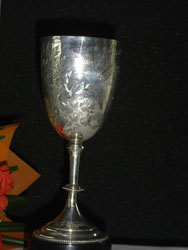Let The Battle For The Waterloo Cup Commence
Let The Battle For The Waterloo Cup Commence
The chase for final field positions for New Zealand’s oldest racing trophy, the Waterloo Cup will be held with qualifying heats at four meetings/venues over the later-half of this week.

Pictured: The time-honoured Waterloo Cup
It is a unique format for this time-honoured event which holds Group 1 status. Heats will be decided at the Cambridge Raceway (457m - Thursday), Addington Raceway (520m - Thursday), Hatrick Raceway (520m - Friday) and at the Manukau Stadium (527m - Sunday). The first two chasers to finish in each of those heats will then advance through to the $35,000 October 6 Auckland hosted final.
With such a long and rich history, there certainly have been some intriguing Waterloo Cup incidents occurring over the years. Here’s a look at some of the “colourful sides” of past Waterloo Cups, plus the progression of the event through to today.
Waterloo Cup History
The Waterloo Cup is steeped in history, with the shape of the race having changed dramatically since the cup was first contested in 1878 in Oamaru, which was won by a dog named Magic. Initially the Waterloo Cup was contested as a coursing event. This involved two dogs hunting down a hare, with dogs being judged on chasing “style”.
In 1888 the Auckland dog Sailor Boy was sent to Dunedin (until 1916 the Waterloo Cup was exclusively contested in the South Island). After winning the title, the following year he was sent to Melbourne to contest the Victorian Waterloo Cup. After making the quarter-finals (from a field of 64) Sailor Boy was unfortunately dog napped, his owner was beaten up on a Melbourne street and the dog was never recovered.
The consolation rounds of the 1904 edition couldn’t be completed owing to a lack of hares caused by poachers helping themselves to the game during an unwanted overnight visit.
Jack Hannan, a stalwart for many decades in coursing and a frequent winner of the Waterloo Cup, had his dog Rhodesia disqualified from the 1936 edition over a payment dispute with the national secretary involving two shillings. Hannan was then listed as a defaulter, while the secretary was fired the following year for embezzlement.
Australian trained coursing dogs were regular attendees at Waterloo Cup meetings, which was contested at numerous South Island venues, with North Island courses being used in later years. A number of New Zealand Waterloo Cup winners crossed the Tasman and enjoyed success in Australian hosted Waterloo Cup events.
The Waterloo Cup was last conducted as a coursing event in 1954 when legislation was introduced to ban coursing. The cup was reinstated in 1971 as a greyhound race, chasing the lure in the form of racing as we know in the code today. Originally it was conducted at Auckland’s Kumeu Raceway for Maidens over 325 yards.
A selection of Waterloo Cup-related pics from the Sam Fletcher “Drag Hare Paddock To Bramich Hare Stadium” publication
From 1977 with Auckland now racing at Mt Smart, it became a race for open class chasers over 578 metres. After the closure of the Mt Smart track in 1983 the race was a tough 500m contest held at the Claudelands Raceway in Hamilton, before transferring back to the Auckland club’s current venue at the Manukau Stadium in 1989.
An additional incentive has been added to Waterloo Cup and that incentive continues for this year’s edition. An agreement between the Auckland Club and the Melbourne based Sandown Park Club now sees the Waterloo Cup winner receiving a prized direct entry into a heat of the world’s richest greyhound race, the A$630,000 Melbourne Cup, known as the “Manukau to Sandown” award.
The Manukau Stadium hosted Waterloo Cup winners this century, with their respective trainers have been:
2000 Rosie Hall Alan Hall
2001 Aqua Fling Delys Van Meeuwen
2002 Black Echo Gary Cleeve
2003 Daphne Bale Craig Roberts
2004 Rasmah Reason Ben & Lisa Craik
2005 Nitro Bird Denis Schofield
2006 Hello Awesome Ian Hastie
2006 Thrilling Lucy Karen Walsh
Two editions were contested in 2006 owing to a change in racing dates.
2007 Paddy Flyin’ Thayne Green
2008 Magic Spike Steve Clark
2009 Tricky Shelley Ray Adcock
2010 Sergio Gary Harding
2011 Little Mother Lisa Ahern
2012 Have A Yap Denis Schofield
2013 Piggy Back Steve Clark
2014 Blitzing Mayhem Steve Clark
2015 Dyna Vikkers Craig Roberts
2016 Thrilling Boris Karen Walsh
2017 Bigtime Paddy Lisa Cole
2018 Pinny Mack Steve Clark
The last three Waterloo Cup winners from left: Thrilling Boris, Bigtime Paddy and Pinny Mack
By Peter Fenemor


